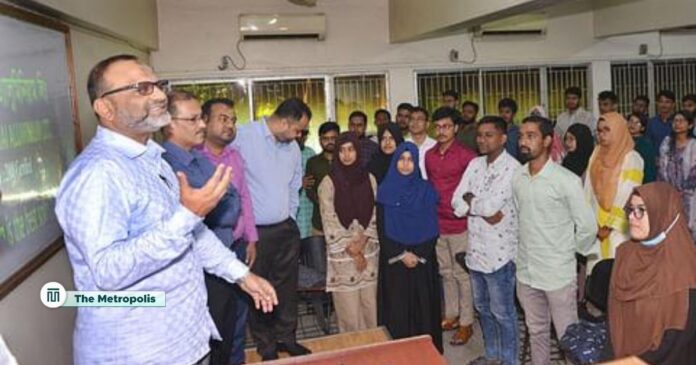Dhaka University has resumed its regular academic activities after a hiatus of nearly three and a half months.
Class schedules have been issued for various faculties and departments across the university.
On June 2, the university went on its summer and Eid-ul-Azha break. However, academic activities remained suspended due to protests from university teachers and staff over a new pension scheme. From July 1, the university’s staff initiated a work stoppage despite the classes being scheduled.
This was followed by a student-led quota reform movement. From July 7, students boycotted classes to push for changes in the quota system.
Although the staff called off their protests on August 4 after their demands were met, students continued their demonstrations, which evolved into an anti-government movement following widespread violence that resulted in the deaths of hundreds.
Under these circumstances, regular academic activities could not resume.
On August 5, amid the mass student uprising, Awami League President Sheikh Hasina resigned from her position as Prime Minister and fled to India. Shortly after, Dhaka University Vice Chancellor ASM Maksud Kamal also resigned.
On August 27, Dr. Niaz Ahmed Khan, head of the Department of Development Studies, was appointed as the new vice chancellor. Following his appointment, Khan engaged with various stakeholders within the university, including faculty heads, administrative offices, and social and cultural groups. During an emergency meeting of the university syndicate on September 13, a date for the resumption of classes was finalized.
Rizia Parvin, a student from the Department of Biochemistry at Dhaka University, expressed her relief, saying, “After overcoming all the obstacles, we’ve returned to campus in a liberated environment. I had a class, and it feels good to be back.”
Mahmudul Hasan Shamim, a student from the Department of Japanese, shared his happiness at witnessing the new atmosphere and the reallocation of seats following the fall of the government. He noted that fourth-year and Master’s students had been under significant pressure during the university’s closure.
Some departments had already resumed classes, while others were in the process of doing so. Shamim expressed hope that classes would return to normal and campus life would regain its usual vibrancy.
Maisha Maliha, a resident of Kabi Sufia Kamal Hall and a student in the Department of Mass Communication and Journalism, said, “Our classes are set to begin tomorrow. The new VC has emphasized that his priority is to restart academic activities, and we should do so as soon as possible. However, the situation remains unstable in the university halls and departments.”
She added that many non-resident female students, including first-year students, are demanding hall accommodations, and starting classes without addressing these demands could lead to an accommodation crisis. Until the issue of ‘Neel Dal’ (pro-Awami League) teachers in certain departments is resolved, normalizing student-teacher relations and fully resuming academic activities could be challenging. However, she also believes that the administration should be given the time to address these issues.
Tashahud Ahmed Rafim, a resident of Surja Sen Hall and student in the same department, shared his eagerness for classes to start, emphasizing that in a country full of protests and struggles, it’s important to keep studying to maintain clarity of thought. He also noted that while private universities have already resumed classes, they have fallen behind. The July Revolution left students mentally distracted, and getting back into academic routines is essential for regaining focus.
The Department of Communication Disorders was set to hold final exams immediately after the holidays, but they were postponed due to the protests. Now, the exam is finally being held on the first day of the university’s reopening. Saidur Brahman Shahid, a third-year student of the department, commented, “Our exam was supposed to take place after the holidays but was delayed because of the protests. Now, our fifth semester final exam is starting on the first day of reopening.”
Many students faced heavy traffic on their way to campus in the morning. Despite this, most felt relieved to be returning to class. Junayed Ahmed, a History student, said, “The traffic was terrible, and the weather was hot, but there’s a sense of peace knowing we could attend class.”
Vice-Chancellor Dr. Niaz Ahmed Khan remarked, “Classes have resumed at Dhaka University after 112 days, in a new Bangladesh. We face major challenges ahead, and there are plans to make up for the lost academic time. Conflicts have arisen in different areas, and work is underway to resolve them.”
He called for cooperation from everyone, acknowledging that both students and teachers have endured significant emotional stress. Nevertheless, he expressed hope that they would overcome these challenges and that the university would soon return to normal operations.



